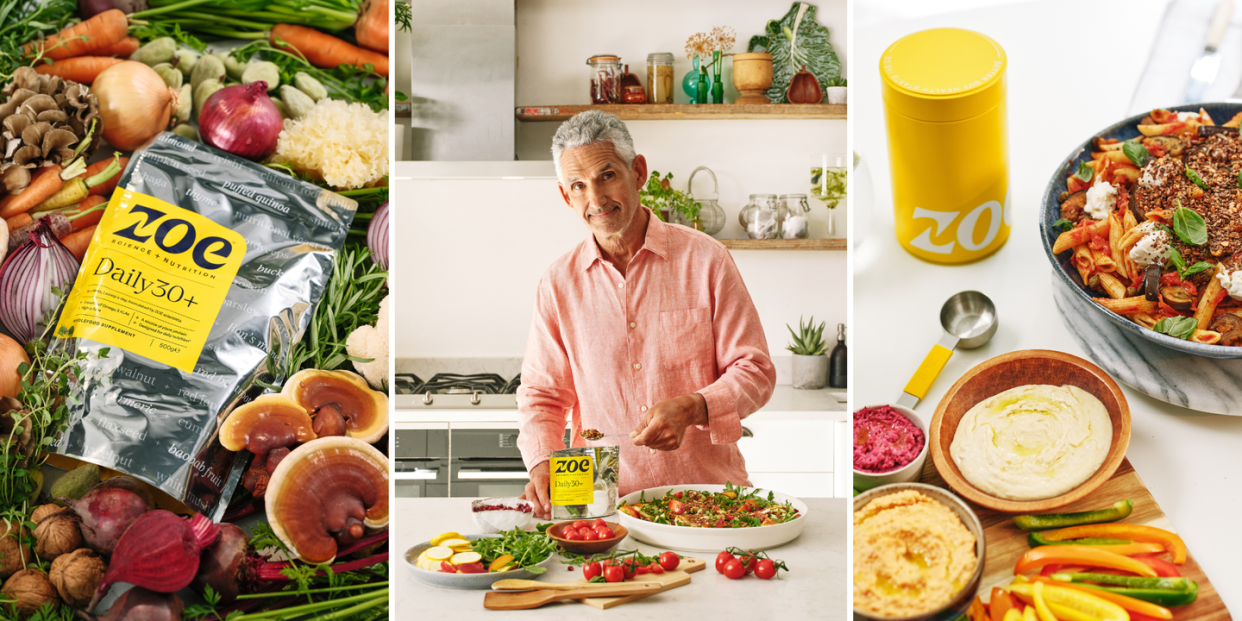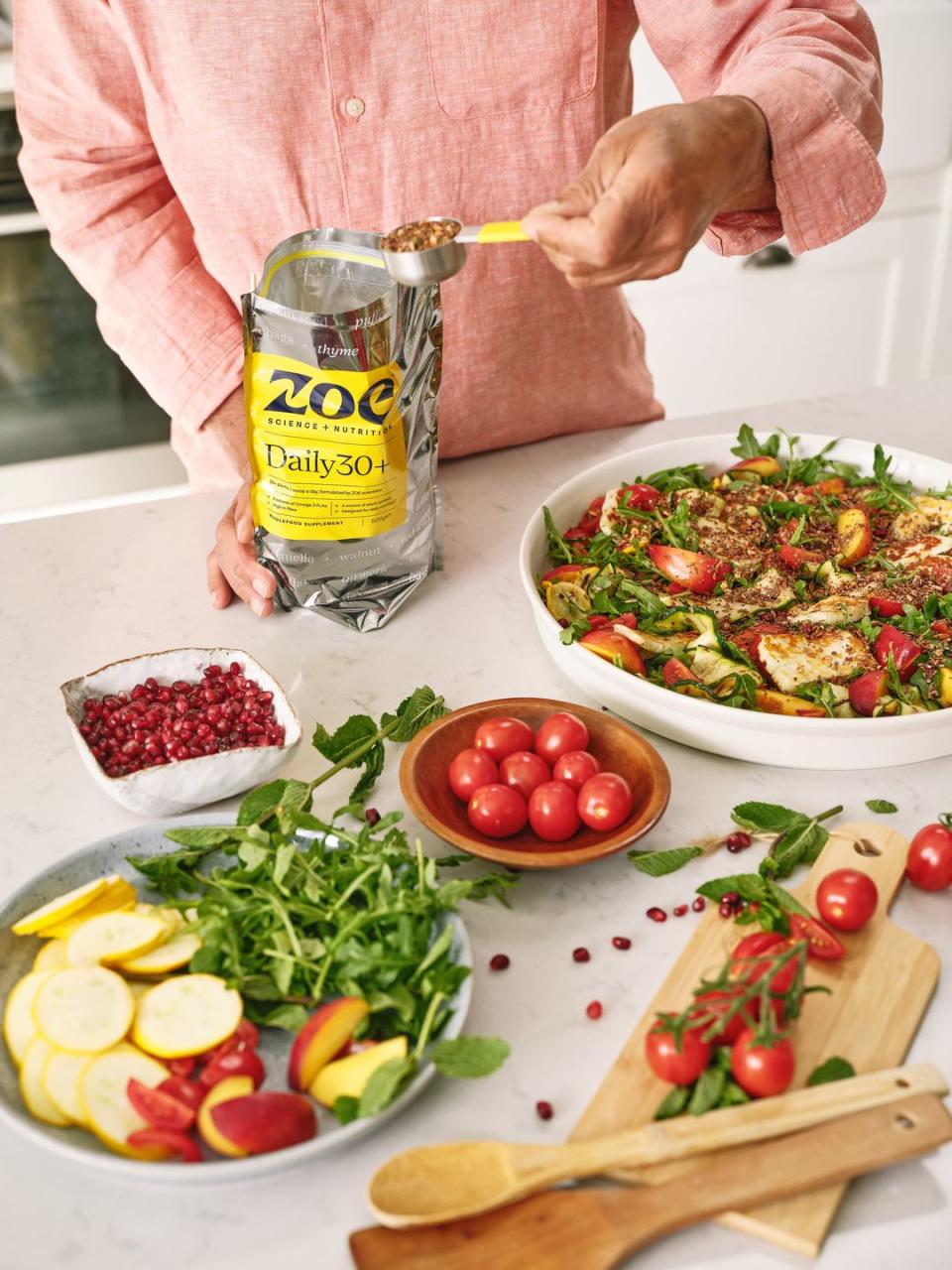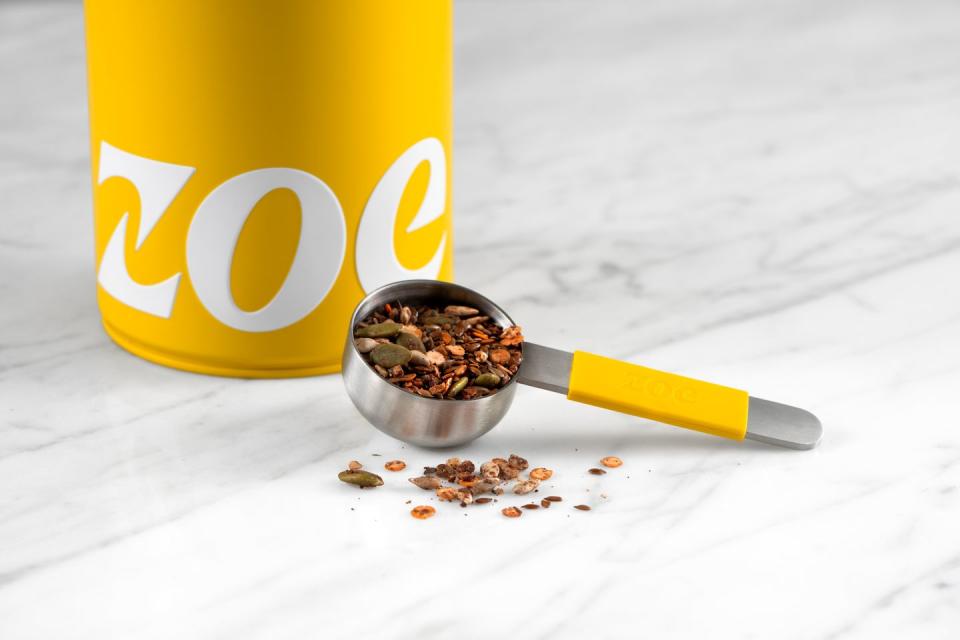Zoe launches Daily30+ — a whole food, plant-based supplement

First came the Zoe app – used by millions of Brits to log symptoms and track the Covid-19 virus’s spread during the pandemic. Then came the circular bright yellow Zoe glucose monitors – which subscribers to the science and nutrition company used to track their responses to certain foods. Membership soared and so too did the Zoe offering – a podcast, a study around intermittent fasting, even a gut shot with the high-streets beloved supermarket, M&S.
And now? They’ve launched a new whole food plant-based supplement – called Daily30+.

What is Daily30+?
Made with a blend of over 30 selected plants, the Daily30+ supplement is designed to be sprinkled on top of any of your meals. Its aim? To improve the diversity of your diet (and overall health) by adding an additional 5 grams of fibre to your food.
One 5-gram scoop of Daily30+ includes 35 different types of fibre and more than 7,000 beneficial plant chemicals.
The ingredients list: 1. Flaxseed, 2. Red lentil flakes, 3. Grape seed, 4. Chia seeds, 5. Sunflower seeds, 6. Chicory root inulin, 7. Pumpkin seeds, 8. Puffed quinoa, 9. Almonds, 10. Hazelnuts, 11. Walnuts, 12. Red beetroot flakes, 13. Carrot flakes, 14. Nutritional yeast flakes, 15. Hemp seeds, 16. White mushroom, 17. Thyme, 18. Onion, 19. Parsley, 20. Tumeric, 21. Cumin, 22. Chaga, 23. Lion's Mane, 24. Shiitake, 25. Maitake, 26. Tremella, 27. Reishi, 28. Cordyceps, 29. Garlic, 30. Rosemary, 31. Baobab fruit pulp, 32. Buckthorn.
What are the benefits?
The Daily30+ supplement was put to the test in a randomised control trial. During a six-week trial where 350 people were analysed, one group consumed Daily30+, compared with a functional control group.
Throughout the trial, participants were asked to log their mood, energy, anxiety, sleep and hunger. Blood and stool samples were also collected to analyse changes to metabolic biomarkers and gut microbiome composition.
Participants reported a reduction in hunger, improvement in sleep, better mood, improved microbiome composition and better energy.
Specifically, the trial showed:
51% improvement in energy
55% reduction in indigestion
35% reduction in constipation
45% improvement in mood (happiness)
35% improvement in sleep quality
21% reduction in hunger
Significant enhancement in gut microbiome composition, with an average increase of 5 points on the ZOE microbiome score.

Who is this supplement aimed at?
Zoe’s Daily30+ supplement is aimed at individuals struggling to meet their recommended dose of fibre. In the UK, the current recommendation for adults is 30g of fibre a day. Yet, on average, we only consume about 20g per day.
The idea is that by adding a scoop of this supplement to your meals, you’ll also be increasing your fibre intake.
‘We know how impactful small daily dietary changes can be for long-term health and that just 5g of added fibre daily can reduce inflammation and heart disease risk, reduce the risk of metabolic diseases such as type 2 diabetes and improve mental health,’ says Dr Federica Amati, head nutritionist at ZOE.
‘We’ve created this product to be added to existing favourite foods, not replacing them, as well as encouraging eating a variety of new foods. This supplement is convenient without compromising on quality or taste. I’ve particularly enjoyed using it to give savoury meals such as pasta dishes, as well as scrambled eggs and salads, more flavour and extra crunch. If you’re not sure how to make great foods like beans, whole grains and lentils taste great: this is the perfect companion for that.’
Zoe supplement review: ‘I tried the Daily30+ for a week – this is what I honestly thought’
Arriving in a giant box, my 4-month subscription to Daily30+ includes a bright yellow Zoe-branded tin, a matching yellow magnetic scoop, and four 500g sealed bags of the nutty blend. I empty one of the bags into the tin and start thinking about what I could try it on.
I cook a midweek classic – baked feta pasta – with extra onions and peppers. I plate it up, and then scoop one serving of Daily30+ over the top of my pasta. On first impressions, it seems like a lot. I wonder if I’ve just ruined my dinner by coating (read: drowning) it in baobab, beetroot, buckthorn and the 30 other ingredients on the list.
I decide the best thing to do is to just mix it all together, so I can still taste the feta sauce. Offering an extra crunch to what’s usually quite a ‘soft’ meal, it definitely changes the overall taste of my pasta dish – although I can’t quite work out if it’s the added turmeric which feels like the odd accompaniment. I think it’s fair to say that while it’s altered the taste, it hasn’t dominated the flavour of my meal too much. And it’s quite a nice feeling to know I’ve increased the amount of fibre in my meal with basically zero effort.
The next day, I decide to add the Daily30+ to my breakfast – thick Greek yoghurt, fresh berries and nuts and seeds granola from Lizi’s. Since I found the serving scoop pretty large on my pasta, I half it – as I’m slightly worried the savoury taste of the supplement will ruin my yoghurt. I end up mixing it all together again – and add a giant teaspoon of honey for an extra hit of sweetness. I’m not the biggest fan, and think perhaps it’s best to save the Daily30+ for savoury meals only.
Over the course of the week, I try it over scrambled eggs, sprinkled on a Greek salad and over roasted vegetables and cous cous. I remember to use it when I leave the yellow tin on my kitchen counter (I mean, it’s so bright, you can’t miss it). But throughout the week, I keep finding it’s made its way into the cupboard (my husband clearly thinks it’s an eyesore!)
Easy to use and super convenient, I love that this supplement is ‘food first’ and I don’t have to try to remember to pop another pill. But there is this nagging feeling at the back of my head that says, this is quite expensive for what’s essentially a bag of nuts and seeds. How is a product – priced at £133 for a month’s subscription – like this going to help the UK as a whole increase their dietary fibre? Wouldn’t it be easier to educate the general public and just get them to add an extra serving of veg to their plate? Or buy a packet of chia seeds (less than £1.50 in my local Waitrose) to sprinkle on their yoghurt or salads?
In summary: I love the idea, but it’s super expensive for what you get – which is basically a yellow tin filled with repackaged nuts and seeds, and priced up.
Where can I try it?
The product is available as a monthly subscription from Zoe’s website and in select Waitrose stores. Monthly and four-pack 500g subscriptions are available for £39 and £133. Zoe members can access discounted member pricing when they log in to their account.
Cut through the noise and get practical, expert advice, home workouts, easy nutrition and more direct to your inbox. Sign up to the WOMEN'S HEALTH NEWSLETTER
More in Nutrition
Thinking about starting the 5:2 diet? Here’s your need-to-know
The egg diet is going viral, but it isn’t the health fix you might think it is
You Might Also Like


